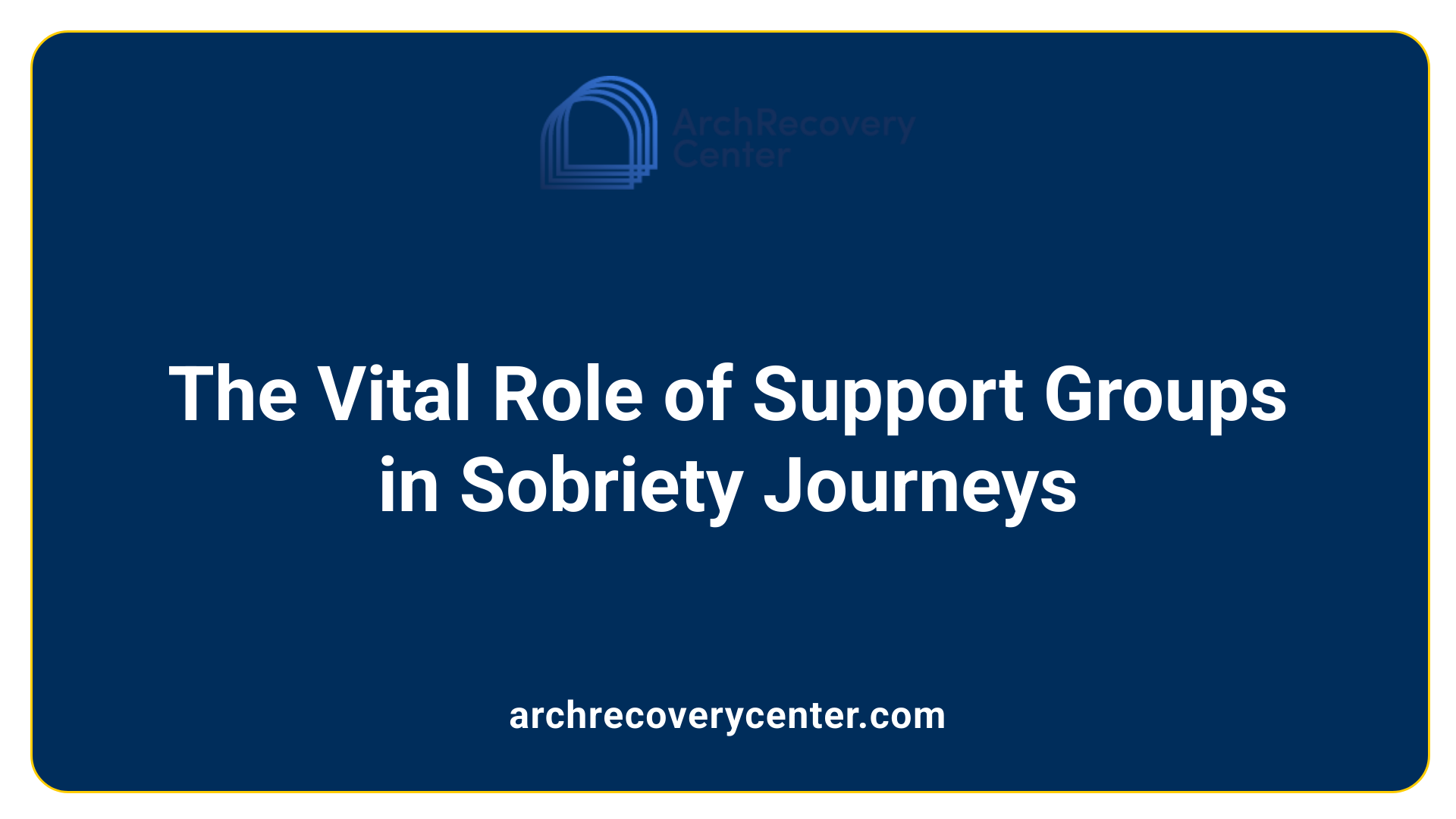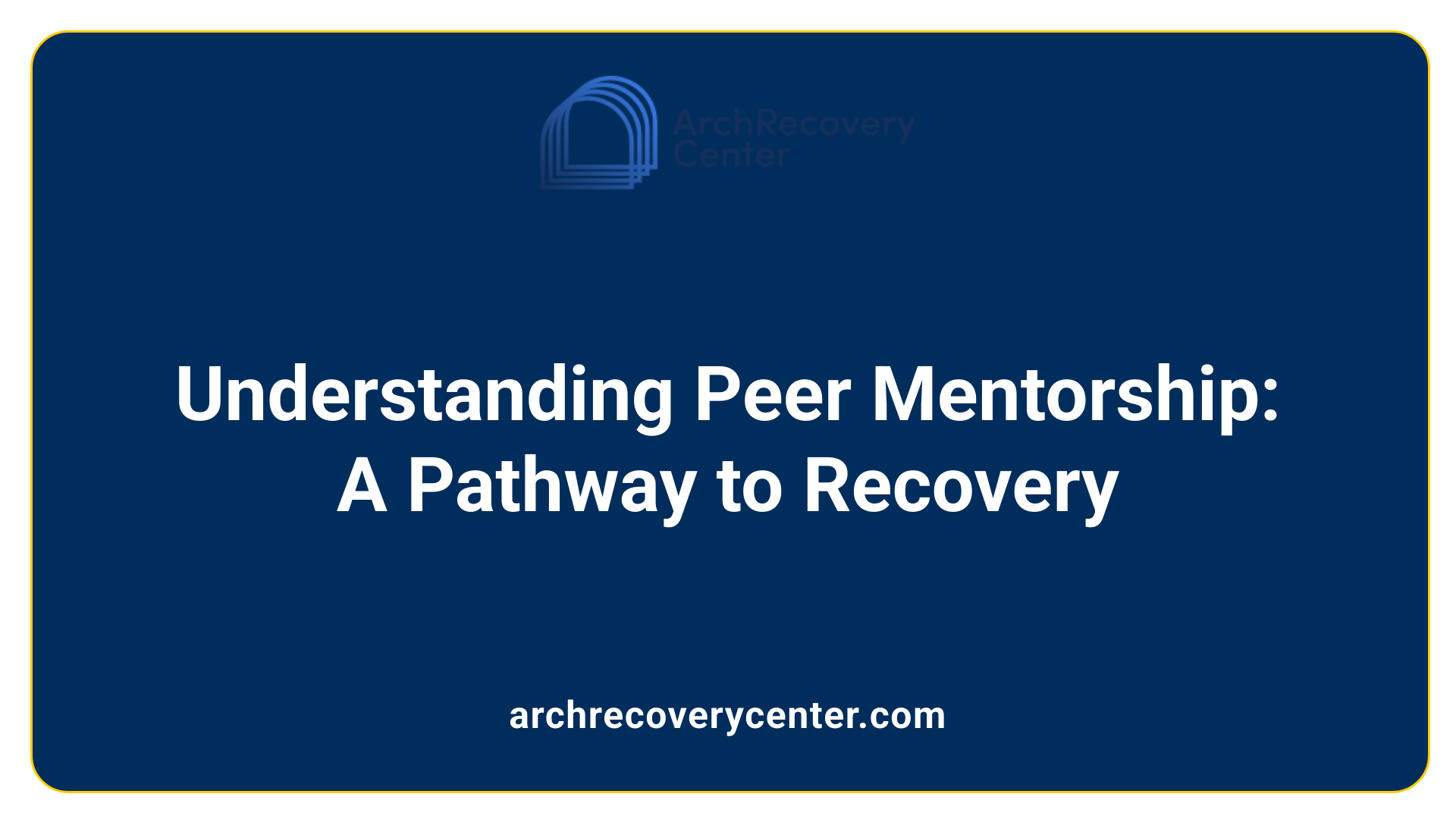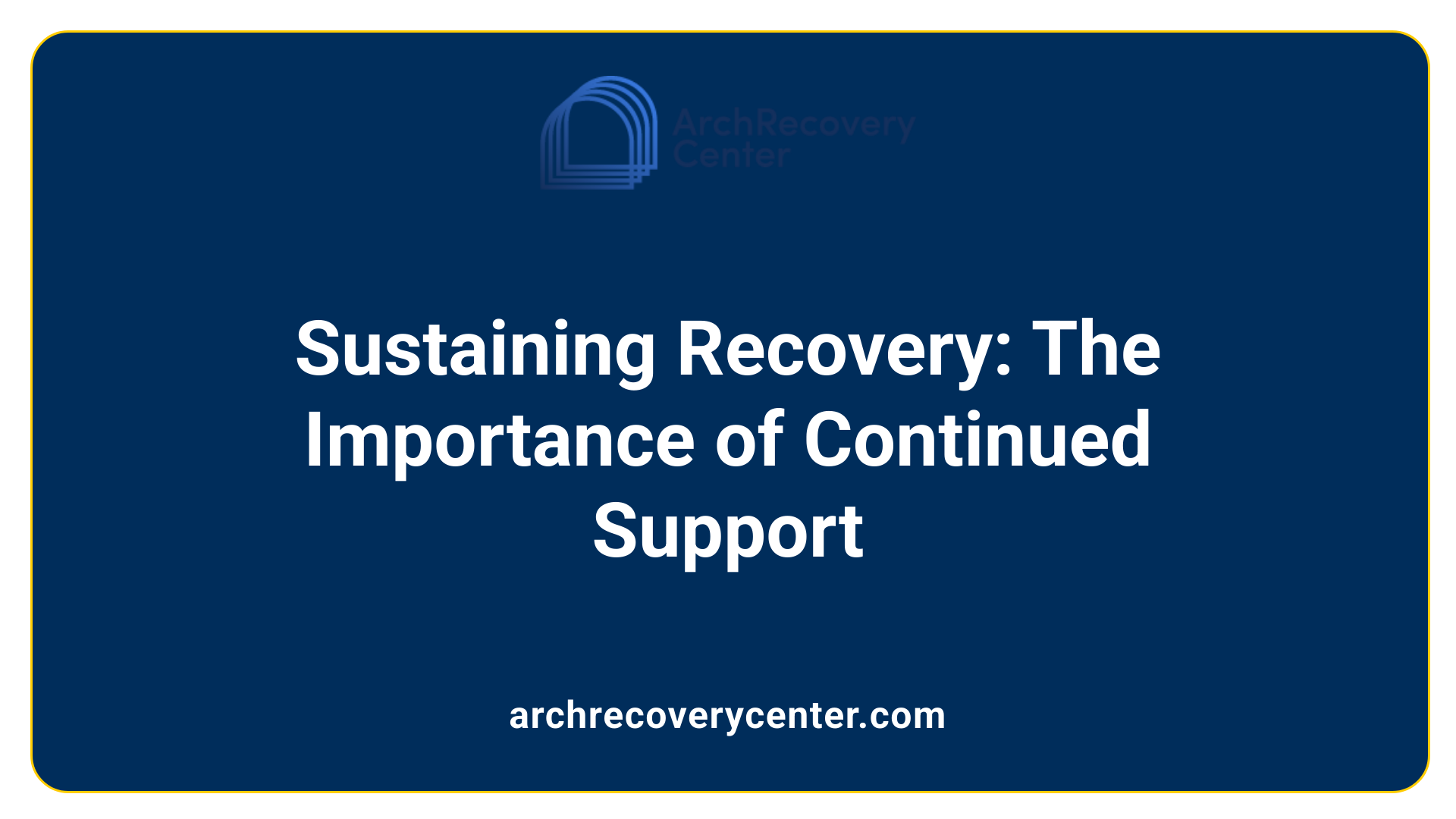The Role of Peer Mentorship in Detox and Recovery

Introduction to Peer Mentorship in Recovery
In today's journey toward overcoming substance use disorders, peer mentorship has emerged as a vital component. This model of support leverages the power of shared experiences to guide individuals through the complexities of detox and recovery. The focus here is to understand the multifaceted role and effectiveness of peer mentorship, its impact on treatment outcomes, and the methodologies adopted by successful programs.
The Role and Effectiveness of Peer Support

What is the role and effectiveness of peer support in addiction recovery?
Peer support plays a crucial role in addiction recovery by providing nonprofessional assistance from individuals who share similar experiences. This engagement creates a strong network of support that enhances long-term recovery from substance use disorders. Participants who join peer support groups often report reduced substance use, improved treatment engagement, and decreased risk behaviors associated with HIV and hepatitis C.
Recent studies, including one that analyzed 65 participants, highlighted that those involved in peer mentorship programs experienced significantly fewer days of substance use compared to those receiving standard treatment alone. This indicates that peer mentorship complements existing treatment modalities, offering invaluable emotional support and realistic coping strategies.
Impact on long-term recovery
The impact of peer support extends beyond immediate substance use reduction. It fosters a sense of community, promoting self-efficacy and empowering individuals on their recovery journey. Mentors provide accountability, ensuring that those in recovery remain committed to their goals. Their lived experiences bolster trust and connection, which are critical for successful engagements in treatment.
Benefits of integration with traditional treatments
Integrating peer support services with traditional treatment methods not only improves adherence to outpatient care but also supports ongoing recovery outside clinical settings. High retention rates, such as the 86.2% observed in the MAP program, showcase the appeal of peer support. While promising, it’s important to note that further rigorous research is necessary to validate the effectiveness of peer support as a standalone treatment, emphasizing the importance of combining these services with traditional therapeutic approaches.
The Benefits of Support Groups in Recovery

How do support groups benefit individuals in addiction recovery?
Support groups serve as a critical resource for individuals navigating the path of addiction recovery. They create a safe and non-judgmental environment where members can share their experiences, challenges, and victories.
One of the key advantages of these groups is the emotional support they provide. Participants often report feeling understood and less isolated. This sense of community and belonging helps to alleviate feelings of loneliness that frequently accompany substance use disorders. Members can vent their frustrations and fears, receiving empathy from peers who truly appreciate their struggles.
In addition to emotional backing, these groups equip individuals with practical coping strategies. Members exchange advice on managing day-to-day challenges, stress, and cravings related to their recovery. This sharing of insights directly correlates with improved self-efficacy, enabling individuals to handle their recovery more effectively.
Research shows that involvement in support groups boosts treatment engagement significantly. These groups contribute to lower relapse rates and foster a commitment to sobriety by holding members accountable. This accountability is crucial as individuals work towards rediscovering their identities and establishing healthy habits post-treatment.
Overall, support groups play a vital role in the addiction recovery process, enhancing both emotional resilience and practical skills essential for long-term success. They facilitate connections that enhance the recovery journey, solidifying their importance in fostering lasting sobriety.
Peer Mentors' Roles in Facilitating Recovery
What are the five roles of a peer mentor in addiction recovery?
Peer mentors play a vital role in addiction recovery, serving in several capacities that aid individuals in their journeys. Five specific roles identified for peer mentors in addiction recovery include:
Connecting Link
Mentors assist individuals in bridging gaps between treatment programs and community resources. This connection fosters a supportive environment, empowering those in recovery.Peer Leader
As peer leaders, they model positive behaviors and effective recovery strategies. Their examples can inspire and motivate others to adopt healthy habits in their own recovery process.Learning Coach
In the role of learning coach, mentors help individuals acquire essential coping skills and knowledge crucial for maintaining sobriety. They provide practical insights that enhance long-term recovery efforts.Student Advocate
Peer mentors champion the needs and rights of their peers. By advocating for individuals, they help ensure that their concerns are heard and addressed within treatment settings and beyond.Trusted Friend
Serving as trusted friends, mentors provide the emotional support and understanding necessary for individuals dealing with addiction. Their shared experiences create a safe space for open discussions about struggles and progress.
These roles combined create an effective framework through which peer mentors facilitate connection, encourage positive behaviors, and help build coping skills, all essential in navigating the complexities of addiction recovery.
Purpose of Peer Mentorship in Recovery

What is the purpose of peer mentorship in the recovery journey?
The purpose of peer mentorship in the recovery journey is to provide individuals with a supportive relationship where experienced peers guide them through their unique challenges. This connection fosters a sense of hope and solidarity, essential for overcoming addiction.
Mentorship encourages individuals to engage in self-reflection, helping them to articulate their recovery goals. By creating an atmosphere of open communication, mentees can freely express their ambitions and concerns, which is key for effective support.
Regular interactions with peer mentors also enhance accountability. This dynamic promotes a consistent focus on recovery, as mentors encourage mentees to remain committed to their goals. Such relationships not only boost motivation but also help in managing cravings and stress during difficult times.
Moreover, peer mentors equip individuals with practical resources and skills necessary for navigating both personal challenges and broader life issues, including employment and healthcare access. This comprehensive support fosters overall growth, significantly benefiting the recovery process.
| Component | Description | Importance |
|---|---|---|
| Goal Identification | Helping mentees set personalized goals | Enhances focus and motivation in recovery |
| Motivation Boost | Fostering accountability through regular check-ins | Supports commitment to recovery efforts |
| Resource Provision | Connecting individuals to helpful resources | Aids in navigating recovery challenges effectively |
Components of Successful Mentorship Programs
What Are the Key Elements of Mentorship Training?
Mentorship training for peer mentors is crucial to the success of programs like the Mentorship for Addiction Problems (MAP). This training ensures that mentors develop the skills needed to guide individuals in recovery effectively. Key components include:
- Communication Skills: Equipping mentors with the ability to engage effectively with mentees.
- Empathy & Understanding: Fostering an environment where mentors can relate to the challenges faced by others in recovery.
How Does Individualized Support Work?
Individual pair contact is designed to provide personalized mentorship crucial for enhancing recovery outcomes. This element allows mentors to tailor their advice to the specific needs of their mentees. Personalization might include:
- Setting individualized recovery goals.
- Addressing unique emotional challenges.
What Role Do Group Sessions Play?
Regular group mentorship sessions create a sense of community among participants. These sessions encourage:
- Sharing of experiences and challenges, fostering mutual support.
- Enhancing treatment retention rates, with MAP reporting an 86.2% retention success.
| Component | Description | Benefits |
|---|---|---|
| Mentorship Training | Essential skills development for mentors | Improved guidance and support for mentees |
| Individualized Support | Personalized mentoring based on individual needs | Enhances engagement and relevance in recovery |
| Group Sessions | Regular meetings for sharing and support | Builds community and improves retention |
Building Emotional Connections and Reducing Isolation
Creating a supportive environment
Peer mentorship fosters a nurturing atmosphere where individuals feel safe to share their challenges and fears. This safe space is crucial for individuals navigating their recovery journeys, as it helps reduce feelings of isolation that often accompany substance use disorders.
Ensuring continued engagement
Building emotional connections with mentors increases engagement in recovery programs. Regular check-ins and open communication establish accountability, making it easier for individuals to remain committed to their recovery goals. Mentors play a vital role in keeping their mentees motivated and focused.
Benefits of shared experiences
Sharing personal stories between mentors and mentees enhances empathy and understanding. These shared experiences create a foundation of trust, allowing individuals to navigate recovery challenges more effectively. As a result, mentees often feel understood and supported, which contributes significantly to their long-term success in sobriety.
Peer Mentorship and Detoxification Process
What Role Do Peer Mentors Play During Detox?
Peer mentors play a vital role during the detoxification process by providing emotional support and practical guidance to individuals navigating withdrawal. These mentors, who have successfully completed detox and are in active recovery, share their experiences and insights, helping clients feel less isolated.
How Do Peer Mentors Assist in Managing Withdrawal Symptoms?
During detox, peer mentors offer strategies to manage withdrawal symptoms effectively. They help individuals cope with emotional struggles and encourage healthy communication, addressing issues like codependency which can arise from substance use. This support is crucial in maintaining motivation and accountability.
What Strategies Do Peer Mentors Provide for Handling Cravings?
Peer mentors equip individuals with strategies for coping with cravings and managing stress. They guide clients in creating structured post-detox plans, leveraging their own experiences to help individuals stay committed to their recovery goals and connect with long-term resources. This dual approach provides both empathy and actionable advice, enhancing overall recovery efficacy.
Ongoing Support Beyond Detox

Long-term support strategies
Post-detox, peer mentorship becomes crucial for sustaining recovery. Mentors offer ongoing emotional support, helping individuals navigate the ups and downs of early sobriety. Through regular check-ins and supportive conversations, mentors foster accountability, encouraging mentees to commit to their recovery goals. This connection is vital for maintaining motivation and resilience in the face of challenges.
Connections to resources
Peer mentors play a pivotal role in linking individuals with community resources that enhance recovery. They provide insights on accessing housing programs, healthcare services, and employment opportunities. This resource navigation is essential, as it ensures individuals have the tools necessary to support their recovery post-detox.
Reducing relapse
Studies indicate that the presence of peer support significantly lowers relapse rates. By sharing relatable experiences and coping strategies, mentors help their mentees manage cravings and emotional struggles. The shared journey of recovery and mutual understanding foster a strong support network, decreasing feelings of isolation and increasing the likelihood of sustained sobriety.
The Importance of Training and Supervision for Peer Mentors

Quality of mentorship
Effective mentorship hinges on thorough training and consistent supervision for peer mentors. Trained mentors possess essential interpersonal skills and a deep understanding of addiction, enhancing their ability to provide empathetic support. Without adequate training, the mentorship relationship may lack the necessary guidance individuals in recovery need.
Ensuring effective support
Supervision serves as a cornerstone to ensure that mentors not only adhere to best practices but also receive feedback on their approaches. This oversight fosters a reliable support structure, enabling mentors to adjust their strategies based on the diverse needs of their mentees. This system helps build trust, ensuring both parties feel understood and supported in the recovery journey.
Training models
Various training models are employed to prepare peer mentors, focusing on practical experiences and theoretical knowledge about addiction recovery. Comprehensive programs often include role-playing scenarios, group discussions, and continuous education, ensuring mentors remain informed about addiction dynamics and recovery resources.
Overall, effective training and supervision are critical to fostering strong peer mentorship relationships that enhance recovery outcomes.
Challenges and Future Directions in Peer Mentorship
Need for empirical research
While peer mentorship in addiction recovery shows promising outcomes, there remains a pressing need for more rigorous empirical research. Current studies indicate improvements in treatment engagement and reduction in relapse rates, but further investigation is essential to strengthen these findings.
Areas for improvement
Despite its benefits, peer mentorship programs could enhance their effectiveness by focusing on mentor training and support. Ensuring mentors are well-prepared with appropriate coping techniques and interpersonal skills can further bolster their impact on recovery.
Potential innovations
Future innovations may include integrating technology, such as mobile applications, that facilitate mentor-mentee communication and provide on-demand resources. These tools can enhance accessibility and support, particularly for those in remote areas or with mobility restrictions.
Concluding Thoughts on Peer Mentorship in Recovery
Peer mentorship is an invaluable resource in the landscape of addiction recovery, bridging gaps between clinical treatment and the personal journeys of those in recovery. With its roots in shared experiences and emotional connection, peer mentorship enhances engagement, provides practical insights, and fosters accountability. However, as we continue to evolve and refine these programs, ongoing research and innovation will be crucial to maximize their potential, ensuring that those on the path to recovery have access to the most effective support possible.
References
- Mentorship for Addiction Problems (MAP): A New Behavioral ...
- Benefits of peer support groups in the treatment of addiction - PMC
- Peer Support Workers for those in Recovery - SAMHSA
- The Role of Peer Mentors in Detox for Couples - Couples Rehab
- Mentor: How Mentorship Helps in Recovery
- The Role of Peer Support Workers in Treatment and Recovery
- The Benefits of Peer Support During Detox - Willard Ohio Detox
- Role of Mentorship in Recovery: Finding and Being a Mentor
- The Benefits of Peer Support in Substance Abuse Recovery
- The Importance of Peer Support in Recovery
Recent articles

How to Develop Healthy Communication Skills in Recovery
April 3, 2025
Mastering Communication: A Key to Successful Recovery

How to Stay Focused on Recovery Goals After Detox
April 3, 2025
Strategies to Maintain Recovery Focus Post-Detox

How to Choose the Right Detox Program for Your Needs
April 3, 2025
Selecting the Best Detox Plan Tailored to Your Health Objectives

How to Develop Patience During Detox and Residential Care
April 3, 2025
Building Patience: A Key to Successful Detox and Recovery

The Benefits of Equine Therapy in Detox and Recovery
April 3, 2025
Harnessing Horses for Healing: A Transformative Path in Addiction Recovery

Why Building New Hobbies Supports Long-Term Sobriety
April 3, 2025
The Transformative Role of Hobbies in Sustaining Sobriety

How to Develop Healthy Tech Boundaries After Detox
April 3, 2025
Reclaiming Balance: Navigating Tech Use Post-Detox

The Role of Peer Support in Detox Programs
April 3, 2025
Unlocking the Potential of Peer Support in Detox Processes

I Need Outpatient Meth Treatment in Scranton PA
March 31, 2025
Discover outpatient meth treatment options in Scranton, PA for a clear path to recovery and support.

A Parents Compass: Navigating the Path to Help Sons with Drug Dependence
March 31, 2025
Discover how to help your son with drug dependence through support, prevention, and effective therapies.

How to Navigate Relationships in Early Recovery
March 31, 2025
Navigating Love and Bonding After Rehab

How to Create a Healthy Living Environment After Detox
March 31, 2025
Crafting a Sober Sanctuary Post-Detox

How to Develop a Growth Mindset During Recovery
March 31, 2025
Transitioning Towards a Sober Future with a Growth Mindset

Why Family Therapy is Critical After Detox and Treatment
March 31, 2025
The Role of Family Therapy in Post-Treatment Recovery

The Importance of Medical Supervision During Detoxification
March 31, 2025
Medical Supervision: A Critical Component in Detoxification Safety

The Emotional Impact of Detoxification and How to Cope
March 31, 2025
Navigating the Emotional Ups and Downs of Detoxification

How Detoxification Can Help Break the Cycle of Addiction
March 27, 2025
Unlocking the Role of Detox in Addiction Recovery

The Role of Support Groups After Detoxification
March 27, 2025
Harnessing Community: Support Groups as Pillars of Recovery Post-Detox

Why Establishing Healthy Routines Reduces Relapse Risk
March 27, 2025
Harnessing Routine to Fortify Against Relapse: The Underrated Power of Daily Structure

How to Handle Relapse Triggers in Early Recovery
March 27, 2025
Strategies to Tackle Early Recovery Challenges

How to Handle Emotional Triggers in Early Recovery
March 27, 2025
Navigating Emotional Triggers During the Recovery Journey

How Family Support Can Improve Detox Success
March 27, 2025
The Crucial Role of Families in Detoxification and Recovery

How Nature Therapy Supports Detox and Emotional Healing
March 27, 2025
Harnessing the Healing Power of Nature for Recovery and Emotional Balance

How Detoxification Prepares the Body for Long-Term Recovery
March 27, 2025
The Fundamental Role of Detox in Achieving Lasting Sobriety

The Link Between Detoxification and Emotional Healing
March 27, 2025
Understanding the Profound Connection Between Detoxification and Emotional Recovery

Average Human Attention Span Statistics
March 24, 2025
Unveil the truth about average human attention span statistics. Discover the factors and trends shaping our focus in this information-driven world.

How to Create a Personalized Self-Care Plan After Detox
March 24, 2025
Crafting Your Path to Well-being Post-Detox

How Medical Detox Reduces the Risk of Relapse
March 24, 2025
The Role of Medical Detox in Preventing Relapse

How Medical Detox Reduces the Risk of Relapse
March 24, 2025
The Role of Medical Detox in Preventing Relapse

The Role of Self-Reflection in Building Long-Term Sobriety
March 24, 2025
Harnessing the Power of Self-Reflection for Sustained Sobriety

Why Mindfulness Practices Improve Detox Outcomes
March 24, 2025
Unlocking the Benefits of Mindfulness for Effective Detox

Why Mindfulness Practices Improve Detox Outcomes
March 24, 2025
Unlocking the Benefits of Mindfulness for Effective Detox

How to Build Coping Skills in Residential Programs
March 24, 2025
Building Resilience and Managing Stress

The Role of Affirmations in Detox and Emotional Healing
March 24, 2025
Harnessing the Power of Positive Affirmations for Recovery

How to Manage Boredom Without Turning to Substances
March 24, 2025
Finding Fulfillment Beyond Quick Fixes: Boredom Strategies for Recovery

Why Residential Treatment is Critical After Detox
March 24, 2025
The Essential Step After Detox: Residential Treatment

The Importance of a Safe Environment During Detoxification
March 24, 2025
Creating Safe Havens: The Role of Environment in Detox Success

How to Embrace Change in Detox and Recovery
March 24, 2025
Navigating the Waves of Change for a Successful Recovery

Understanding the Role of Alternative Therapies in Recovery
March 24, 2025
Exploring Complementary Paths in Addiction and Health Recovery

How to Stop My Sugar Addiction
March 24, 2025
Breaking Free from the Sweet Escape: Conquering Sugar Addiction

The Role of Relapse in Recovery and How to Bounce Back
March 24, 2025
Understanding Relapse and Resilience in Addiction Recovery

The Role of Support Groups in Maintaining Sobriety After Residential Treatment
March 24, 2025
Harnessing the Power of Support Groups for Lasting Recovery

How Prescription Drug Rehab Programs Address Psychological Dependency
March 24, 2025
Unpacking Psychological Dependency in Medication Rehab

How to Help an Alcoholic
March 24, 2025
Comprehensive Strategies for Supporting Alcoholic Loved Ones

How to Create a Relapse Prevention Plan After Residential Treatment
March 24, 2025
Crafting a Personalized Path to Sustainable Recovery

Symptoms of Cocaine Withdrawal
March 19, 2025
Understanding the Complexities of Cocaine Withdrawal Symptoms

The Importance of Setting Goals for Long-Term Sobriety
March 19, 2025
Goal-Setting: A Catalyst for Achieving Sustained Sobriety

Who Qualifies for Free Rehab Centers?
March 19, 2025
Navigating the Path to Free Drug and Alcohol Rehab Services

Holistic Approaches to Long-Term Sobriety
March 19, 2025
Embracing the Whole Self in Recovery

Breaking Down the Stages of Addiction Recovery
March 19, 2025
Understanding the Journey Through Addiction Recovery

The Role of Residential Treatment in Opioid Addiction Recovery
March 19, 2025
Exploring the Impact of Residential Treatment on Opioid Addiction

How Long Does It Take to Break a Porn Addiction
March 19, 2025
Understanding the Recovery Timeline for Porn Addiction

Accredited Drug Treatment Centers in Langhorne PA
March 19, 2025
Discover the Best Accredited Drug Treatment Facilities in Langhorne

The Importance of Forgiveness in Recovery
March 19, 2025
Unlocking Healing: The Role of Forgiveness in Addiction Recovery

How Does Detox Impact the Brain and Body?
March 19, 2025
Exploring the Effects of Detox on Brain Function and Overall Health

Welcome StR Alumni of Addiction Treatment
March 19, 2025
Discover the Power of Community in Addiction Recovery

How Detox Centers Provide Emotional Support During Withdrawal
March 19, 2025
The Crucial Role of Emotional Support During Withdrawal

Types of Mental Disorders
March 19, 2025
Understanding the Diverse Spectrum of Mental Health Conditions

How to Break Phone Addiction Adhd
March 19, 2025
Managing Smartphone Dependence for Those with ADHD

How to Stop Sugar Addiction
March 19, 2025
Breaking Free from Sugar: Understanding and Overcoming Your Addiction

What Is Suboxone?
March 19, 2025
Exploring the Role and Mechanics of Suboxone in Opioid Addiction Treatment

How to Support a Loved One Through Detox and Residential Treatment
March 19, 2025
Navigating Detox and Treatment: A Supporter's Guide

The Role of Medication-Assisted Treatment in Recovery
March 19, 2025
Exploring the Impact of Medication-Assisted Treatment on Substance Use Recovery

Drugs Are All Around
March 19, 2025
Exploring the Omnipresence of Drugs in Modern Society

The Importance of Aftercare Planning in Prescription Drug Rehab
March 19, 2025
Unlocking Success: How Aftercare Planning Sustains Recovery in Drug Rehab

Three Common Symptoms of Withdrawal
March 19, 2025
Understanding the Symptoms of Withdrawal

5 Dangerous Designer Drugs
March 19, 2025
Unmasking the Threats of Synthetic Drugs

I Dreamed About Using Drugs – What Does That Mean?
March 19, 2025
Unpacking the Subconscious: The Meaning Behind Drug Dreams

The Connection Between Childhood Trauma and Addiction
March 19, 2025
Unraveling the Ties Between Early Trauma and Addictive Behaviors

Am I Going Through Opiate Withdrawal?
March 19, 2025
Recognizing and Managing Opiate Withdrawal

Managing Stress Without Substances During Recovery
March 19, 2025
Exploring Substance-Free Stress Management in Recovery

How Residential Treatment Centers Help You Rebuild Your Life After Addiction
March 19, 2025
Rebuilding Lives: The Role of Residential Treatment Centers in Addiction Recovery

The Role of Education in Reducing Relapse Rates
March 19, 2025
Harnessing Education to Combat Relapse in Addiction and Mental Health Recovery

How Detox Helps Address the Physical Aspects of Addiction Recovery
March 19, 2025
Understanding Detox: The First Crucial Step in Overcoming Addiction

Understanding the Impact of Alcohol on Physical Health and Recovery Options
March 19, 2025
Understanding the Impact of Alcohol on Physical Health and Recovery Options

Matthew Perry's Sober Living Center
March 19, 2025
Honoring the Legacy of Matthew Perry's Support for Addiction Recovery

Exploring the Role of Pet Therapy in Recovery
March 19, 2025
The Transformative Impact of Animal Companions in Healing Journeys

Ways Yoga Helps With Recovery
March 19, 2025
Discover the Healing Power of Yoga

The Role of Therapy in Residential Treatment for Addiction
March 19, 2025
Exploring the Essential Therapeutic Approaches in Residential Addiction Recovery

Reasons That People May Become Codependent
March 19, 2025
Unpacking the Roots and Causes of Codependency

Why Support from Family and Friends Is Key During the Detox Process
March 19, 2025
The Crucial Role of Family and Friends in Detoxification

Outline of Treatments for Drug Abuse
March 19, 2025
Exploring the Spectrum of Drug Abuse Treatments

Coping Methods for Living with an Alcoholic
March 19, 2025
Navigating Life with an Alcoholic Spouse: Strategies for Support and Self-Preservation

Lady Gaga and Her Struggles with Drug Abuse
March 19, 2025
Inside Lady Gaga’s Battle and Advocacy Against Drug Addiction

Celebrities Conquering Addiction
March 19, 2025
Inspiring Journeys of Recovery: From Rock Bottom to Redemption

What Is a Holistic Treatment Center for Addiction?
March 19, 2025
Exploring Comprehensive Healing at Holistic Addiction Treatment Centers

The Science of Habit Formation and Breaking in Recovery
March 19, 2025
Understanding the Mechanisms of Habit Change for Lasting Recovery

Why Residential Treatment Centers Focus on Holistic Healing
March 19, 2025
Exploring the Impact and Importance of Holistic Approaches in Rehab Centers

What Is Speed Drug?
March 19, 2025
Understanding the Substance Often Called 'Speed'

The Benefits of Physical Activity in Sobriety
March 19, 2025
Unleashing the Power of Exercise in Addiction Recovery

Purple Drank Ingredients
March 19, 2025
Unveiling the Components and Concerns of Purple Drank

The Benefits of Humor Therapy in Addiction Recovery
March 19, 2025
Harnessing Laughter: A Key to Successful Addiction Recovery

How to Prepare for Life After Detox and Residential Treatment
March 19, 2025
Navigating a New Chapter: Post-Treatment Recovery Success

How Residential Treatment Centers Help Patients Reconnect with Loved Ones
March 19, 2025
Unlocking Emotional Bonds: The Role of Residential Treatment Centers in Healing Family Ties

Timely Addiction Treatment Importance
March 10, 2025
Why Time is of the Essence in Fighting Addiction

How to Stop Porn Addiction
March 10, 2025
Uncovering the Path to Recovery from Pornography Addiction

What Foods Are Good for Recovering Alcoholic
March 10, 2025
Nourishing the Path to Sobriety: Foods That Aid Recovery from Alcoholism

What Are Psychotic Breaks?
March 10, 2025
Understanding the Experience and Management of Psychotic Breaks

How to Address the Emotional and Psychological Challenges of Detox
March 10, 2025
Overcoming Emotional Hurdles in Detox: A Path to Healing

Why Therapy Should Be a Key Part of Detox and Residential Treatment
March 10, 2025
The Integral Role of Therapy in Addiction Recovery Programs

